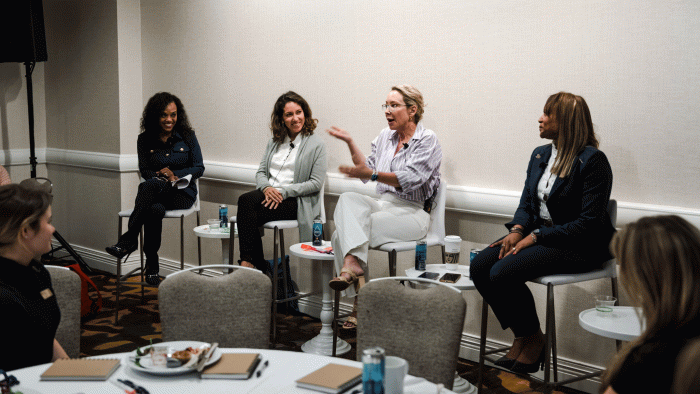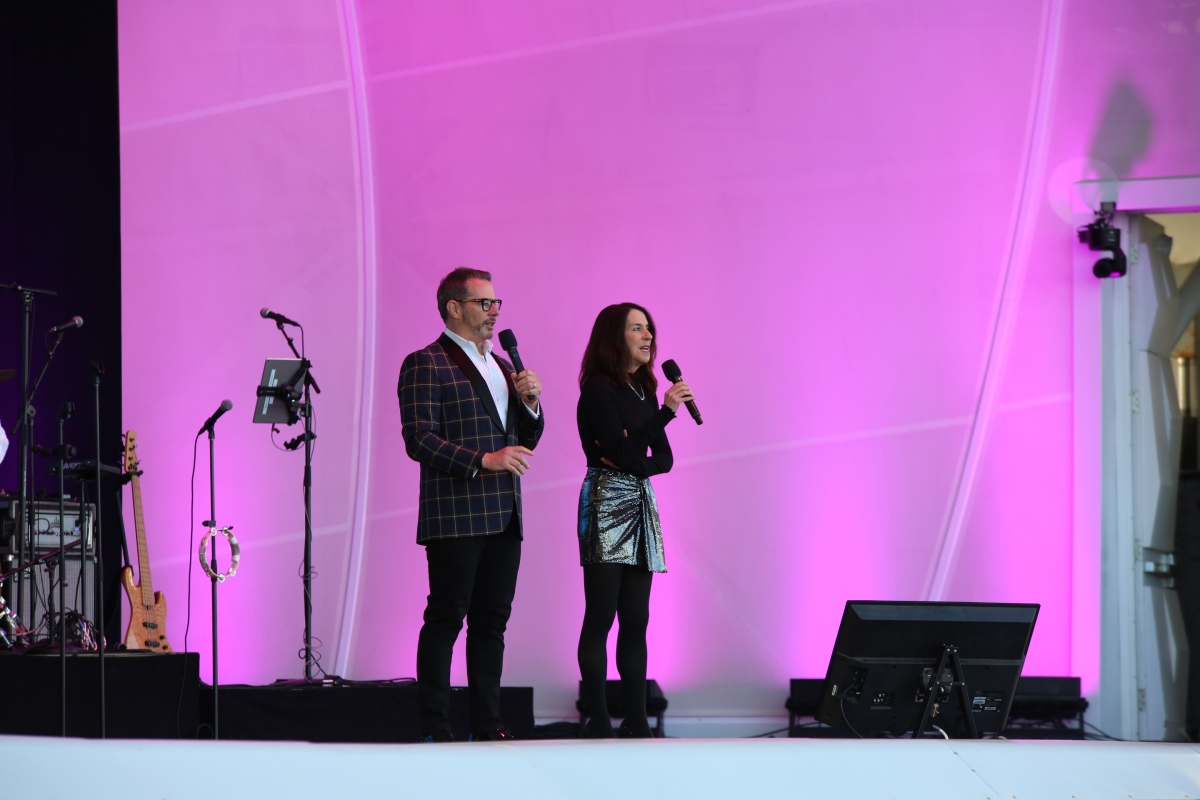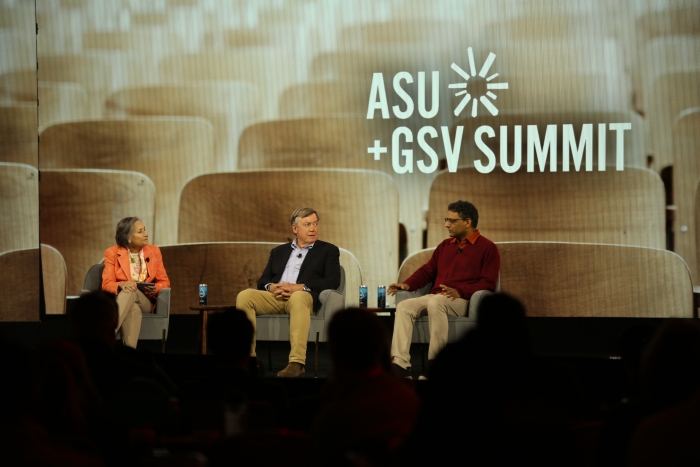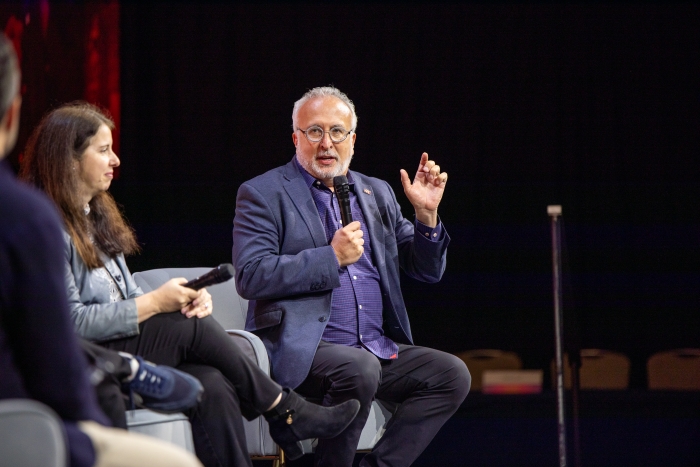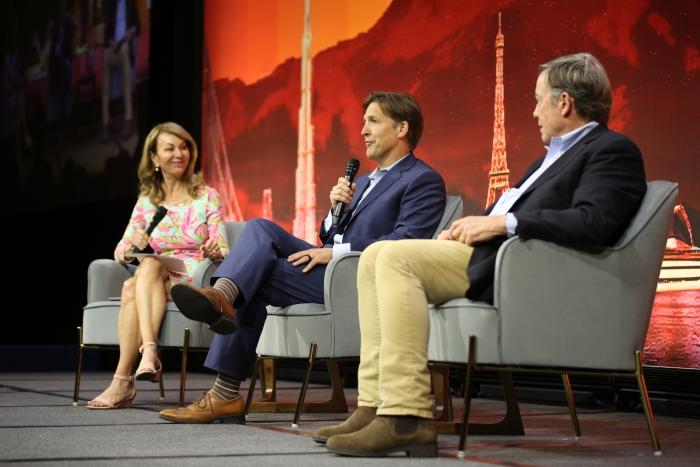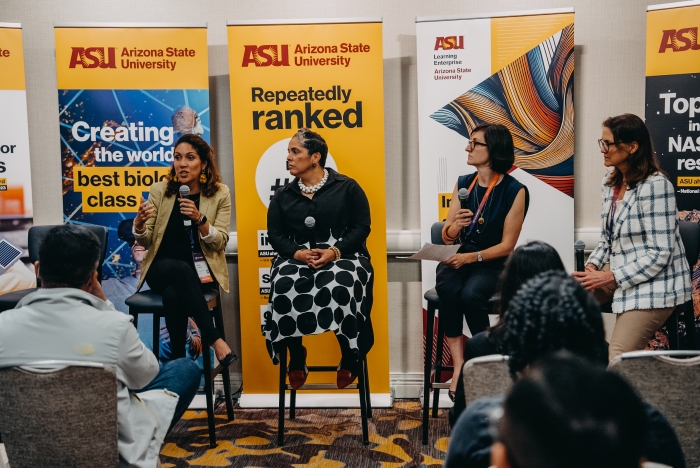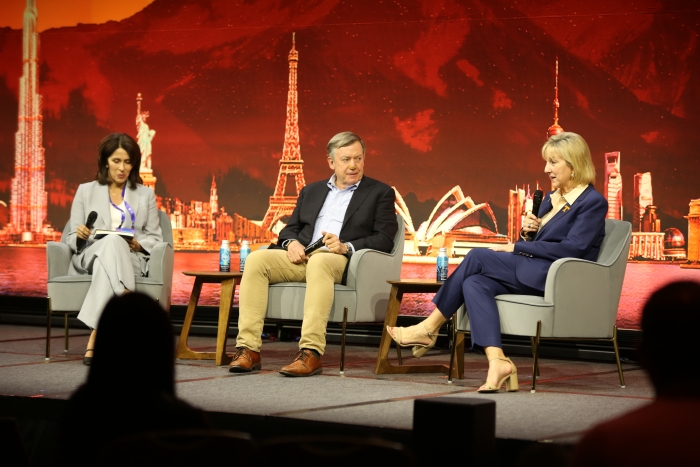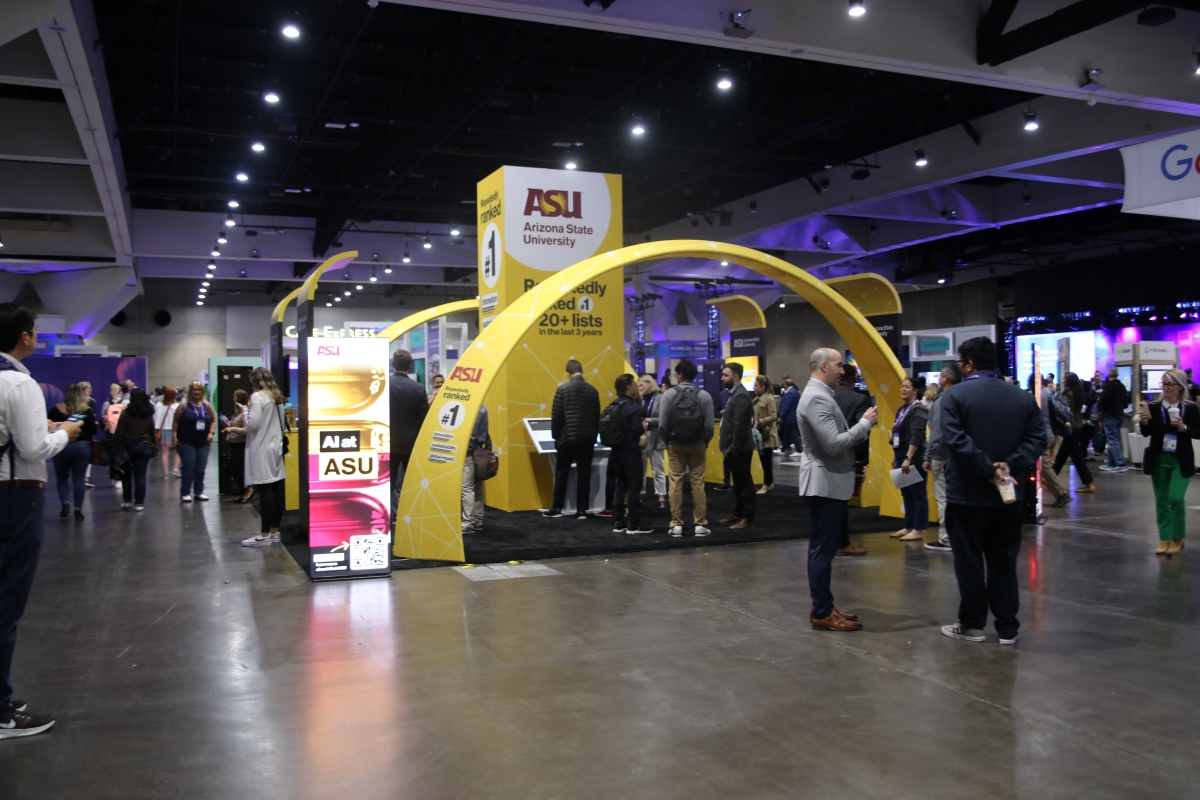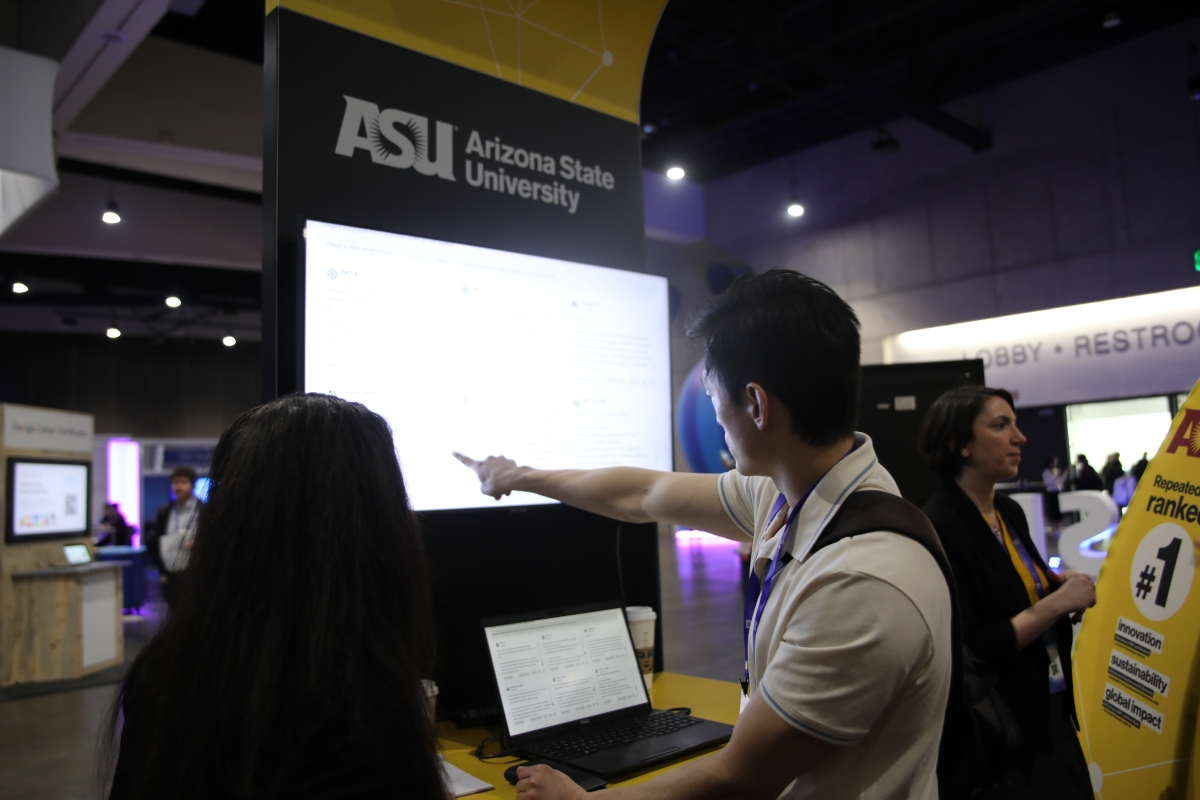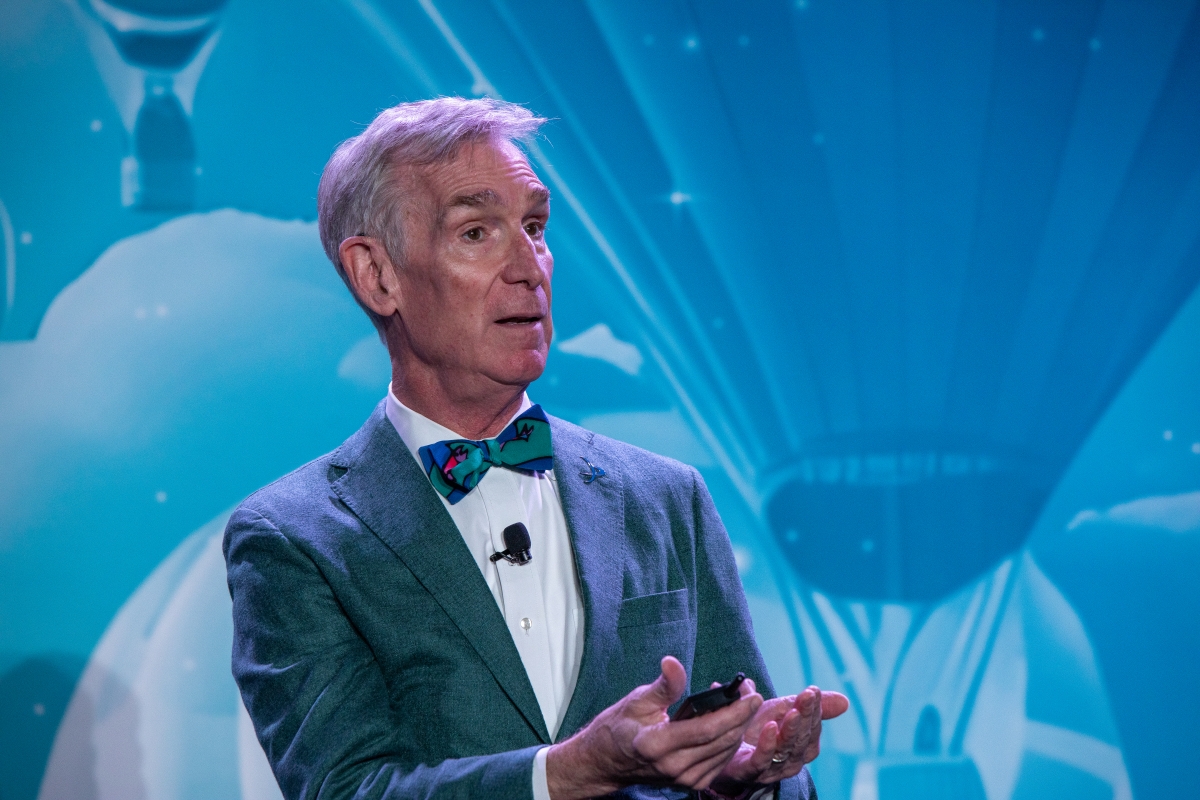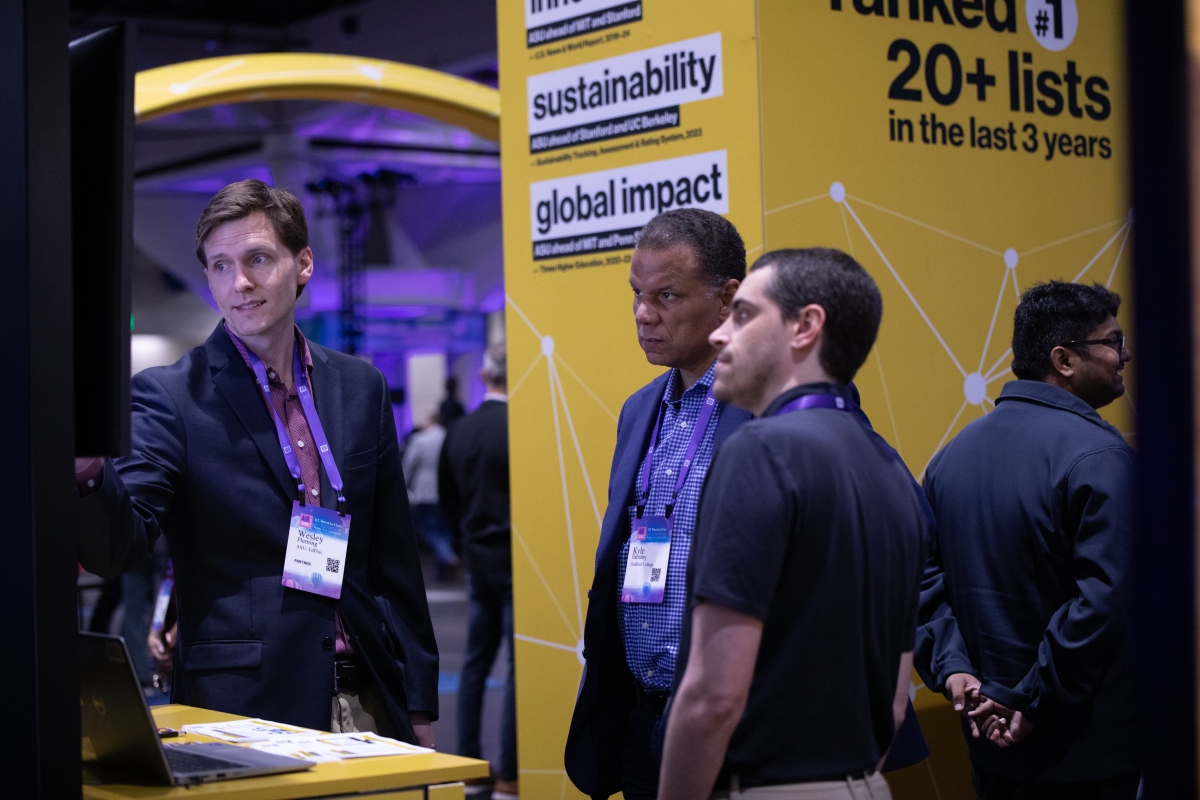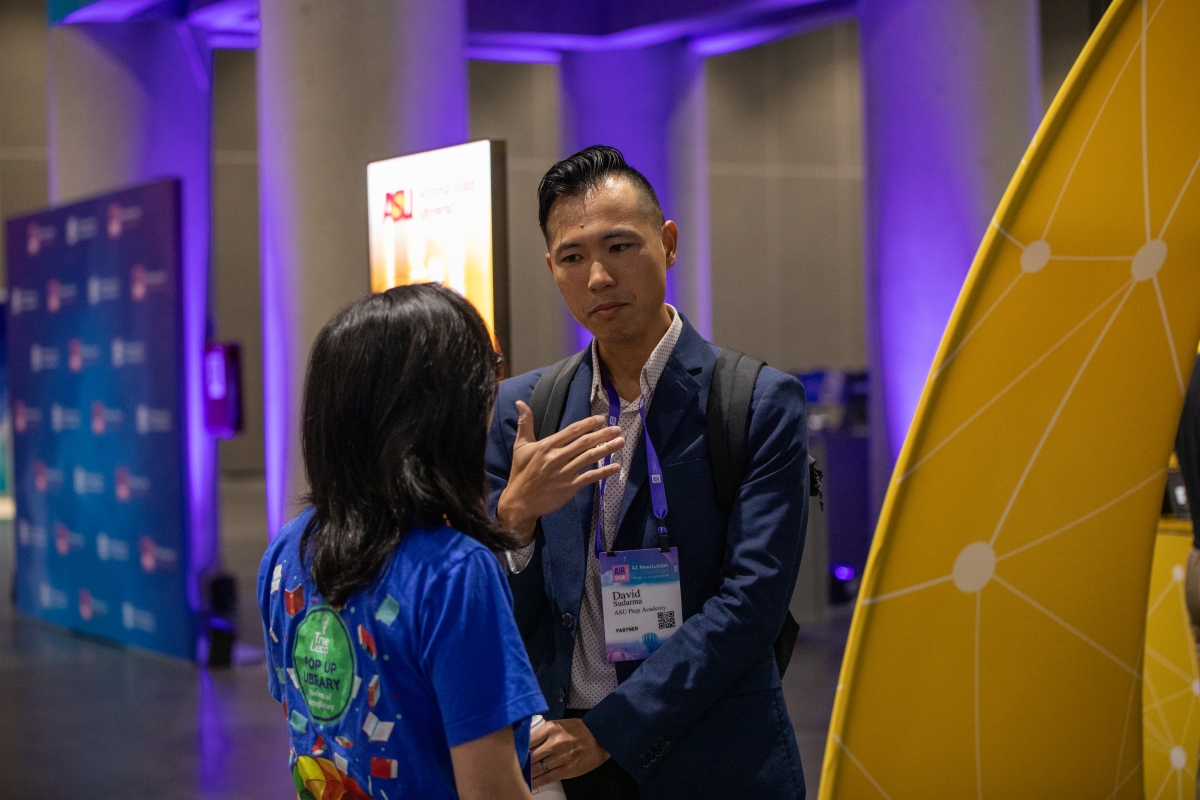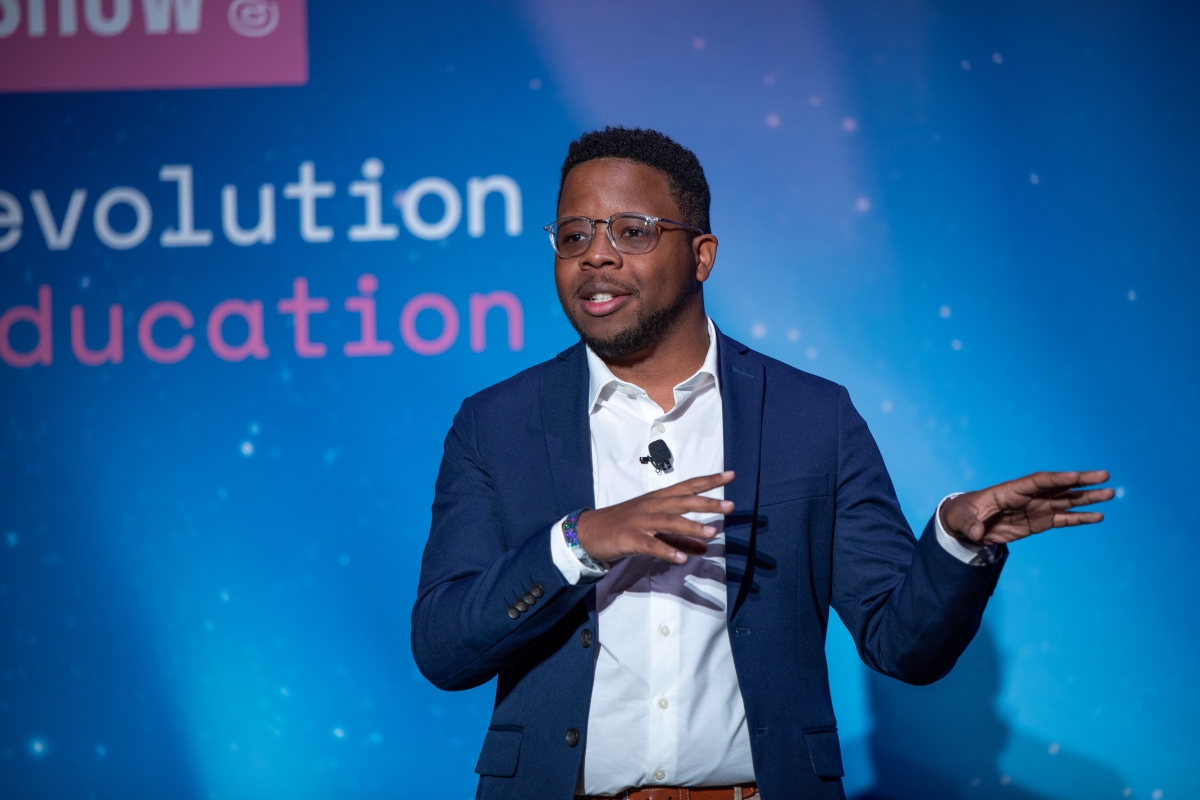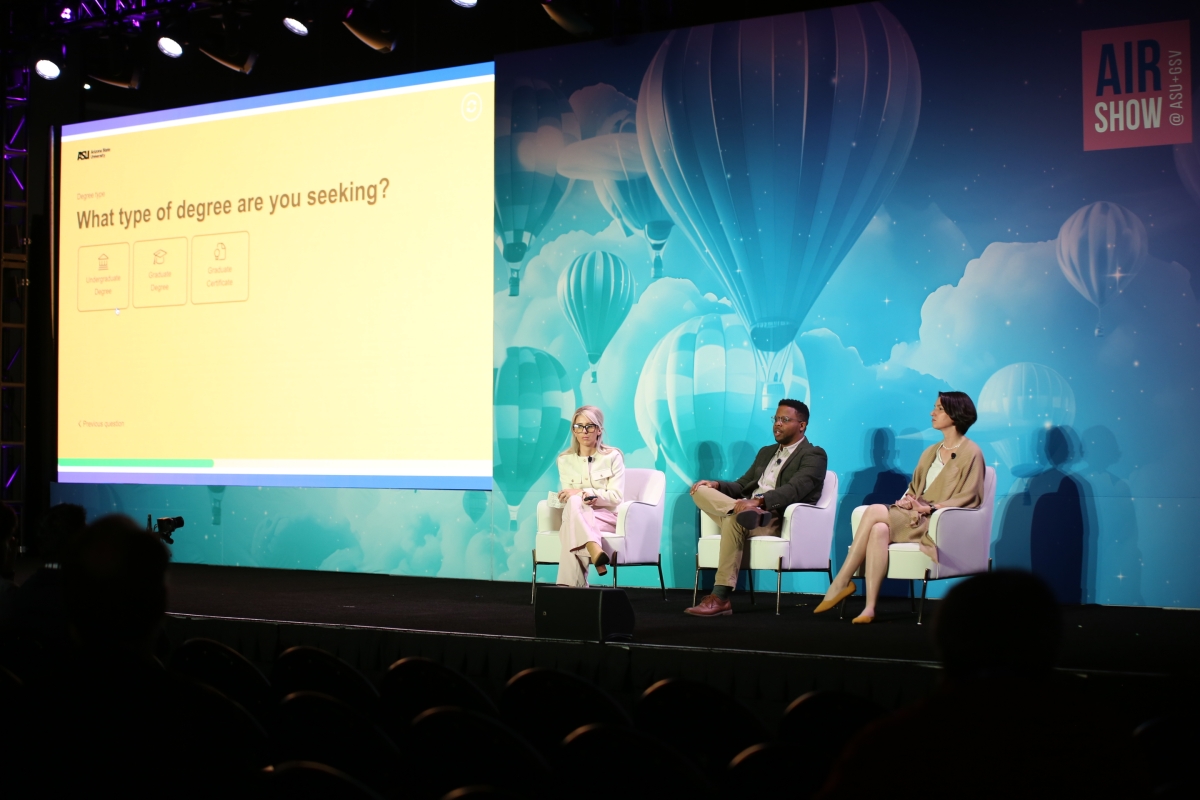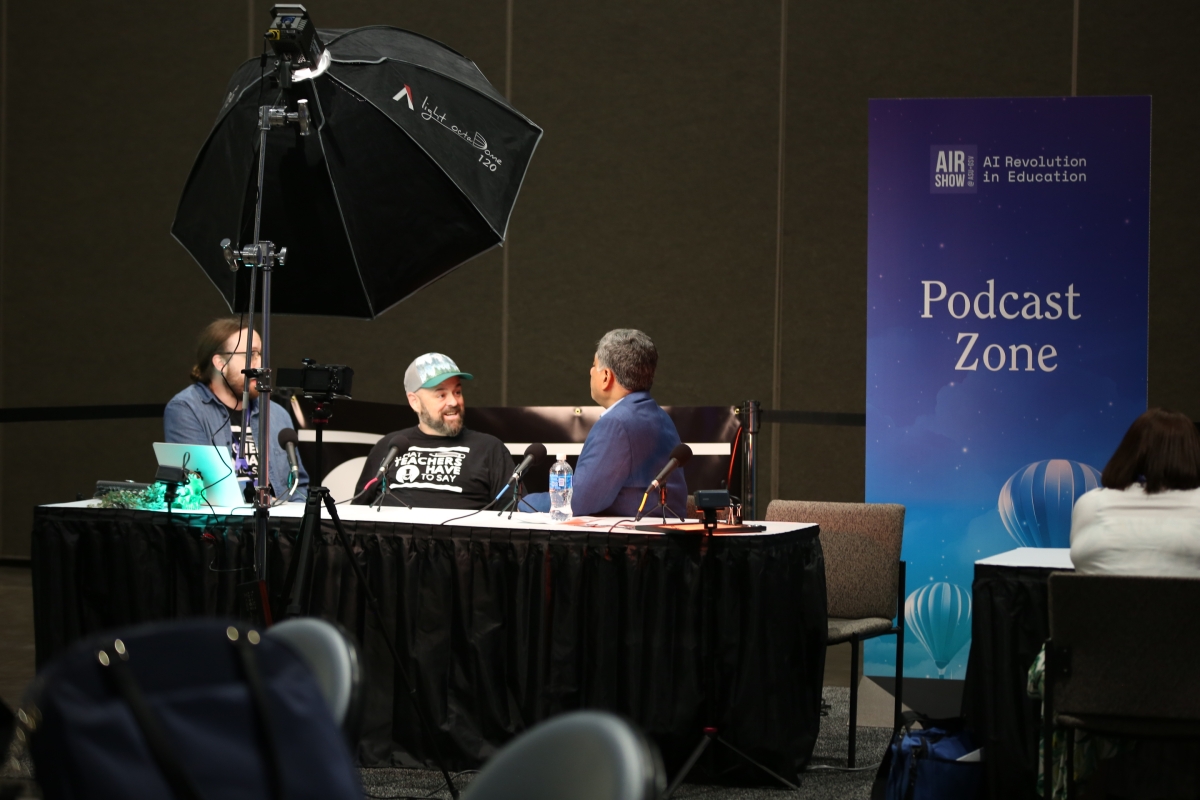ASU+GSV Summit tackles big questions about AI, technology, education
2 new ASU partnerships announced during summit
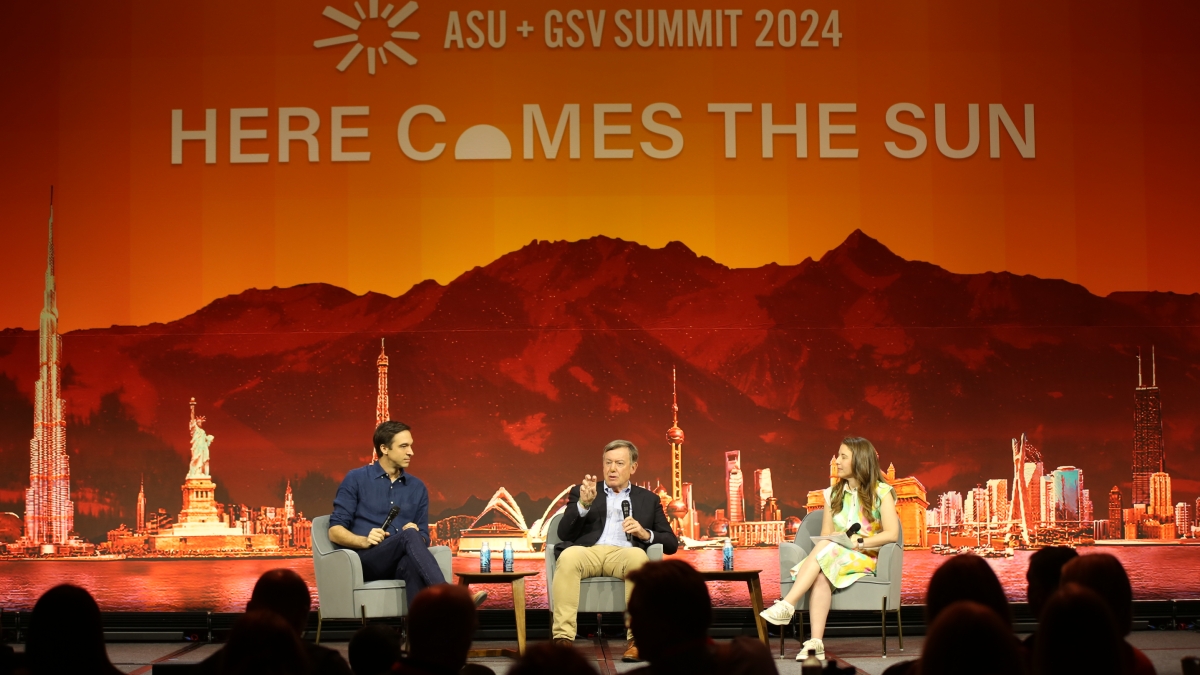
From left: Endless founder Matt Dalio, ASU President Michael Crow and moderator Jacqueline Smith, senior vice president of the ASU Foundation, take part in a panel about using gaming modalities and technologies to infinitely scale learning. Photo courtesy of EdPlus at ASU
Editor's note: We'll be updating this story daily throughout the summit.
The annual ASU+GSV Summit kicked off in San Diego on Sunday, drawing thousands of leaders for a four-day event that focuses on delivering education and workforce skills at scale.
This year’s theme is “Here Comes the Sun,” and new to the 2024 summit is a special AIR Show at ASU+GSV on AI revolution in education. The new event, which is free for attendees, takes place at the San Diego Convention Center on April 13–15 and features talks, performances and more that celebrate the ways artificial intelligence has been leveraged — from preschool through higher education.
On Monday morning, Arizona State University announced two new innovative partnerships during panels with ASU President Michael Crow.
Crow described collaborations with the University of Tennessee, Knoxville, and with Endless Network, both of which will make digital education more accessible.
Here are some highlights:
Wednesday, April 17
From grit to greatness: Stories of transformational women leaders in education
Businesses with female CFOs are more profitable and generate excess profits of $1.8 trillion. Yet only 10.4% of Fortune 500 companies are led by women, and 33% of universities have female presidents.
Why the disparity — and what can we do about it? For starters, women need communities of support that offer safe spaces.
A panel on Wednesday aimed to create such a space for current and aspiring female leaders to address challenges and share personal experiences.
ASU Learning Enterprise Executive Vice President Maria Anguiano elevated the first-generation college student perspective on the panel, which was moderated by Toni Farmer-Thompson, provost and chief academic officer of Strayer University, and also featured Constance St. Germain, president of Capella University, and Melissa Patton, vice president at Space Foundation.
Panelists illuminated their own unique paths to executive leadership and then invited participants to stay after for an executive coaching session so they could get more direct one-on-one support.
For Anguiano, she ultimately found strength in her challenges as a first-generation student, which ignited a career devoted to expanding access to education for all learners – and eradicating social and economic barriers.
“It all comes down to owning your journey,” Anguiano said. “That means setting goals and vocalizing them to the people in a position to support you. Speak up. By doing so, you hold yourself accountable while inviting others’ help. And, when you’re in a position of power, be sure to open up safe spaces for others to speak up and validate each other’s experiences.”
A conversation with Paula Abdul
The ASU+GSV Summit wrapped up Wednesday night with a conversation with choreographer and pop star Paula Abdul, moderated by Makeda Mays Green, senior vice president for digital and cultural consumer insights for Nickelodean/Paramount.
“When you dwell at that level of purpose, passion and power, there are so many ways you can be inspired. What inspired your journey into the entertainment industry?” Green asked.
Abdul described watching the movie “Singing in the Rain” with her family when she was 4 years old.
“Gene Kelly is what ignited my love and my mission,” she said.
“The truth is, I never had a backup plan. I always knew I was going to do this. When I’m all of five foot nothing and I don’t fit the mold, I had to learn to break it to fit in.”
She discussed how perseverance is key to success.
“Talent is just part of it. There is talent in abundance. Everyone here has talent,” she said.
“Are you going to be tenacious? When you’re having a bad day will you still get dressed and show up?”
Abdul got her big break when she became a Laker Girl, a dancer for the Los Angeles Lakers NBA team. She described how she persevered after she was initially cut.
“I thought, ‘I have to go back.’ I ran into the ladies’ room, changed out of my leotard, put my hair in a ponytail and got a new number and entered under my middle name, Julie,” she said.
She was cut again, along with the friends she carpooled with.
“I said, ‘Can you wait one more round? I have one more outfit.’ They said, ‘No, take a cab home.’”
She tried out a third time and made it.
“That explains how you have to be tenacious and believe in yourself like a child believes in Santa Claus,” she said.
Tuesday, April 16
Augmented intelligence: Reimagining how the world learns
At a panel on Tuesday morning, Benedict Gomes, senior vice president for learning and education at Google, described how the technology giant has moved from serving up unlimited amounts of information to organizing information into a coherent learning experience.
Initiatives such as Study Hall — a new way to earn college credit through ASU — are curating the wide-open landscape of YouTube.
“We’re taking that curiosity and putting it onto a pathway and turning it into an outcome at ASU,” Gomes said.
Study Hall is an example of “Realm 5 learning,” Crow said.
“It’s this notion of ubiquitous, massive access to learning opportunities, knowledge and information that are available to the individual in the way that the individual learns,” he said.
“It’s a customizable, digestible learning pathway designed and structured by the individual learner.”
Gomes said Google is using augmented intelligence to create individualized learning through ShiffBot, a chatbot that augments the coding videos created by computer programmer Dan Shiffman.
“You can ask the question in the moment you’re doing coding,” Gomes said, and the bot will answer.
Crow emphasized the critical importance of using technology such as augmented intelligence to empower every individual to learn.
“What I’m driven by is how do we find a way to find the interests and talents and trajectory of each individual person and empower that?” Crow said.
“Right now in the U.S., you can predict educational outcomes based on a person’s zip code. We have to figure this out.”
Will generative AI be the world’s greatest learning acceleration?
Lev Gonick, chief information officer at ASU, told the conference crowd on Tuesday that we’re at a seminal moment with the surge of AI.
“When we last had this conversation in the spring a year ago at ASU+GSV ... the question was, ‘Would anyone be using this tool?’" he said.
“My view was, ‘Let’s ask our students.’”
It turns out that 41,000 students used ChapGPT during the four days of the exam period.
“The institutional view is to realize that there’s no putting the genie back in the bottle. The journey we’ve been on is to institutionally engage across the full breadth with 5,700 faculty.”
More than 1,700 ASU faculty members have signed up for an AI accelerator experience that will have them share their perceptions.
“There are plenty of assumptions and biases that faculty don’t want to innovate and are scared, but literally a third of ASU’s faculty signed up for this,” he said.
Quddus Pativada, founder and CEO of ASI, a company that creates AI tutors, said that the interface is the current bottleneck to student usage.
“At ASI, we’re creating interfaces to mold to what the student wants,” he said.
“Another thing is not thinking about how students access AI but the ability of AI to access the student. One of the biggest problems in education is motivation. You have a powerful technology in front of you or a powerful book in front of you, but how do you sit down and read it?”
Gonick also described how ASU is taking its Dreamscape Learn extended-reality biology lab to the next level by developing a personalized tutor within the experience.
“It’s the whole idea of finding ways to engage students so they’re motivated to learn what has been extremely complicated lab materials in biology,” he said.
The role of universities in advancing democracy
Former U.S. Sen. Ben Sasse, now the president of the University of Florida, and ASU President Michael Crow discussed how public trust in higher education has eroded and why.
Sasse said that, in 2015, 59% of Americans had trust in higher education, and that percentage fell to 36% in 2023.
“What’s even stranger is that even among parents who have kids who finished college in the last decade, only 50% think that higher education is a valuable institution, and that’s mostly due to underperformance,” he said.
Crow said that universities have not delivered on the promise of the American dream.
“All kinds of people complain about universities and when you delve into it more, they think that universities are filled with crazy people and think that universities are not listening to the public, and they think that universities are not available to them,” he said.
“Trust is down because people want our universities to be more impactful for them and we’re not delivering on that.”
The two college presidents weighed in on whether American universities are the best in the world.
“I still am of the view that there are no institutions that are as capable as American universities in adaptability, in driving forward the society and in creativity,” Crow said.
“We still have this notion in our culture of competition. In other countries, even in industrialized countries in Europe, the universities receive grants as formulas and the universities are controlled by ministries of education.
“It means in the U.S. that we have more diversity and more willingness to innovate, and unbelievable competition in everything from sports to faculty acquisition. But we have to avoid complacency.”
Sasse says he would distinguish between education and research.
“The top 50 to 100 (American universities) have unbelievable research output. It’s the glory of the world,” he said.
“Pedagogically, I’m not persuaded that a lot of institutions are earning their keep.”
Both presidents said that universities cannot be short-term landing spots for only four years in a young person’s life.
“We still let people — parents and taxpayers — perpetuate the myth that you have nothing do with the university, zero percent, and then you’re there for four years and then you leave,” Sasse said.
“We need to build a come-and-go institution where this infrastructure is connected to people’s lives.”
Crow said that universities should be involved with every family and business.
“We’re too focused on the negative, negative, negative,” he said.
“We’re far too willing to not advance American exceptionalism. This is a fledging democracy on a planet that’s lived through autocrats and dictators for tens of thousands of years. Universities need to do more things to help us make it.”
AI unleashed: Beyond incremental to revolutionary tech in education
No technology has seen such fast widespread adoption in the past 50 years as generative AI. Emerging technologies, like virtual reality, have seen a more gradual uptake in both the consumer and education sectors at large. At the speed of AI’s evolution, how are we ensuring more learners are benefiting from its most innovative applications?
On Tuesday, Maria Anguiano, executive vice president of ASU’s Learning Enterprise, joined panelists Vicki Zubovic, chief external relations officer of Khan Academy, and Shirley M. Collado, president and CEO of College Track, to discuss how AI is setting new benchmarks for personalized learning and global educational impact. The panel was moderated by Stephanie Khurana, CEO of Axim Collaborative.
The group explored how generative AI has the potential to make learning opportunities more accessible to all learners, including those with learning differences or language barriers. Through speech recognition and natural language processing, for example, AI is facilitating communication and comprehension for students with different needs.
Plus, starting as early on in their education as possible, AI-driven assessment tools can evaluate student performance and understanding in real time, providing immediate and actionable feedback on assignments, tests, and projects — even recommending specific pathways for them.
ASU’s Learning Enterprise works to advance universal access to learning at all stages in life, and AI has the potential to reach and engage learners throughout their major life events. As such, Anguiano left the audience with a call to action to be even more revolutionary when it comes to how we think about AI and emerging technologies.
In sharing her personal experience in a self-driving car around Phoenix, for example, she referenced how, despite the progressive technology, the interior and structure were so similar to a normal automobile. There’s no driver, Anguiano said, so why is there still a driver’s seat?
“The design doesn’t make sense. But it’s because that car wasn’t designed to be self-driving. And so in many ways, if you translate that to education, it’s: We weren’t designed for this technology, and so we’ve got to redesign the car with the new tools that we have.”
Monday, April 15
Infinitely scalable learning: Are games a new frontier?
Crow, along with Matt Dalio, the founder of Endless Network, announced the creation of the Endless Games and Learning Lab at ASU, made possible by a $5 million gift from Endless.
The Endless Lab will advance ASU's pursuit of what it terms “Realm 5 learning” — massively distributed, universally accessible, high-intensity and personalized learning solutions for all people. The Endless Lab will be part of the Herberger Institute for Design and the Arts and physically will be within the Media and Immersive eXperience (MIX) Center in Mesa.
Dalio, who met Crow at the ASU+GSV Summit two years ago, said during Monday’s panel that one of his “aha” moments was that every time he asked a computer engineer how they learned to code, the answer was “As a kid, I loved games.”
“If you can lean into the instinct that is already there, in a kid playing Minecraft, we believe you can teach youth en masse in a way never possible before,” Dalio said.
Crow said that games such as “Sims” and “Minecraft” teach complex sociological, political and management skills, and that Realm 5 learning can be done because we already have the tools to create individual pathways for each learner, every one of whom is different.
“Games are one of the pathways to enhance these learning outcomes,” he said. “Through playing games you’re learning.”
The new center will close the quality gap between popular games and games that have been developed specifically to educate.
“Pillar one is to look at how you bridge the gap from the perspective of the craft of game making — it’s an art to make games,” Dalio said.
“Then there’s the entrepreneurial perspective. How do you build a business model that sweeps the world?
“And then there is the academic perspective. What is the research and science behind it?”
Crow said that the new technology will better teach subjects such as the “hard sciences,” which have been considered difficult to learn and teach.
“How do we enhance learning so no human is left behind because of some human construct?” he said.
“How do you take the supercomputer that is the human mind and empower it in every possible way? We now have the capability to build those things.”
The future of education at scale
Crow said that there’s resistance to the massive technological changes ahead because people can’t believe that new processes can be better.
“If you take a person like myself, my tools were a pencil, a piece of paper, a slide rule and a book. Those are unbelievable ways of learning. But if you’re educated in that one realm, it’s difficult to imagine the next realm,” he said.
He also said that with new AI technologies, students must be viewed as co-creators in the learning experience.
“I talk to my AI tool and it talks back to me or draws images of things. There’s nobody involved but me and this tool. We have to have a different kind of status for students going forward.”
Michael Hansen, CEO of Cengage Group, said that while gaming is a way to teach and engage the human mind, the relationship between teacher and student will remain central.
“We need to figure out how these platforms can enhance that relationship, but frankly, over half of students in our education system don’t have access to that,” he said.
He said that faculty need to be trained on new technology tools.
“But 70% of faculty in the U.S. are adjunct,” he said.
“They’re very hard-pressed for time and don’t want to spend hours to learn something new. We have to make it easy to learn and save them time so they can focus on teaching students, particularly those that are advanced and those left behind.”
Doug Becker, founder and CEO of Cintana, said that AI can simultaneously widen and close the equity gap in education.
“AI tutors give lie to the idea that students go online as a shortcut and a cheat. It’s the opposite,” he said.
Breaking barriers and empowering students
ASU and the University of Tennessee, Knoxville, are announcing a collaboration to make it easier for more adults to get a high-quality college degree. The two universities will co-design new education opportunities and develop solutions to support the workforce needs of their respective states and surrounding regions.
Starting in fall 2024, University of Tennessee, Knoxville, students studying fully online will have access to a selection of general education courses through the ASU partnership that previously had not been available, allowing direct access to nine fully online undergraduate degree programs.
The course exchange will allow the University of Tennessee to more quickly develop online degree programs, and academic units at both institutions will have the opportunity to collaborate with their counterparts in designing and launching new programs at each school or even jointly.
At the ASU+GSV Summit on Monday, Donde Plowman, chancellor of the University of Tennessee, said that her university is behind in developing an online learning initiative. She was intrigued by Crow’s offer to partner and his advice to focus on undergraduate degree programs.
“Michael said that if you’re going to help the socioeconomic situation in Tennessee, that’s where you have to start,” she said.
“We have 100,000 people in Tennessee who have degree credit but no degree. In the last year alone, we’re attracting businesses like crazy — 77,000 new businesses in one year. And the fastest growing segment where there’s a need for employment is the four-year college degree segment.”
She said that her university will learn from ASU’s experience in developing EdPlus, which is approaching the milestone of 100,000 graduates.
Crow said that large social problems are bigger than any individual higher education institution.
“We’re not profit seekers. We’re social outcome seekers. We have for-profit partners we work with and for-profit vendors we purchase from,” he said.
“But we can work together to focus only on students and not worry about whether shareholders are satisfied with the return on the venture.”
Crow said that ASU will learn from the University of Tennessee.
“Every university has spikes of excellence, with clusters of faculty that are better than others or individual programs that are unique,” he said.
“We’re hoping to find ways to leverage the University of Tennessee’s expertise and faculty knowhow on solving problems. We think there should be more alliances, more partnerships and more joint degrees.”
Making an impact in California: Higher education leaders on learning and the edtech revolution
Sonya Christian, chancellor of the California Community Colleges, described her system’s “Vision 2030” and what it means to be truly open access.
“We have 2 million students, the largest higher education system in the U.S. Yes, we take everyone who comes to us, but what about the 6.8 million Californians who have a high school diploma but no college credit and are in low-income jobs with no hope for economic mobility?
“Vision 2030 is not about building it and they’ll come, but if you’re open access with equity, we have to find those who haven’t found their way to college and bring college to them.”
That will require technology, she said.
“There is a promise and anticipation that the AI tool can raise the profiles of a large number of individuals rather than have the elites, the stratification,” she said.
The California Community Colleges are signing data-sharing agreements with large employers to facilitate the process of awarding credit for work experience to large numbers of workers.
“If you have a health care aide, you have to recognize the learning that happened in her 10 years of work,” she said.
Crow said it has only been within the past 100 years that society decided that high school was necessary.
“What Sonja’s talking about is hard for people to get their arms around,” he said. “The California Community Colleges have taken the lead in figuring out how to be ubiquitously present for everyone.
“We have to find a way to look at learners as the unit of analysis, not the college or the university or the state.
“We made egregious social errors by not continuing the learning process. If you want to drive up the American economy, drive up wages, drive up the standard of living, drive up income, drive up the competitiveness of the U.S., we must find a way to make every person an engaged learner at scale.”
Samantha Becker contributed to this report.
More Arts, humanities and education
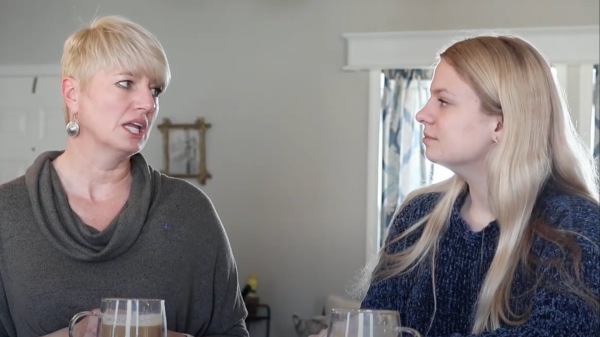
Data science student investigates Arizona education system, reform through Steve Jobs fellowship
Arizona State University student Brinlee Kidd was one of nine people across the U.S. chosen for the inaugural Steve Jobs Archive (SJA) Fellowship, launched last year with the goal of allowing young…

Data science student investigates Arizona education system and reform through new fellowship
The Steve Jobs Archive (SJA) Fellowship was launched last year with the goal of allowing young people the ability to enhance their creative, professional and personal development. Nine people from…
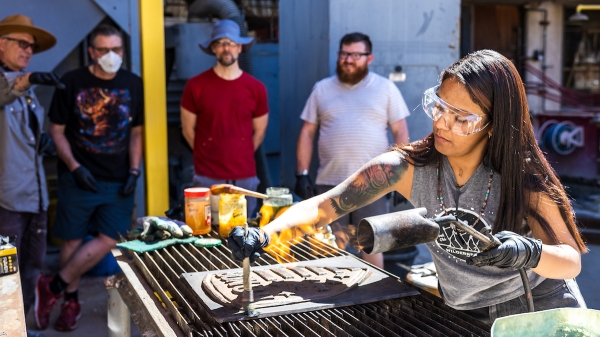
'Devils in the Metal': ASU vet leads iron cast workshop for former service members
Bruce Ward believes everyone has a symbol of strength or resilience, and they have an obligation to find it. His happens to be a paper crane in an ocean wave. “It’s the idea that we are the…
